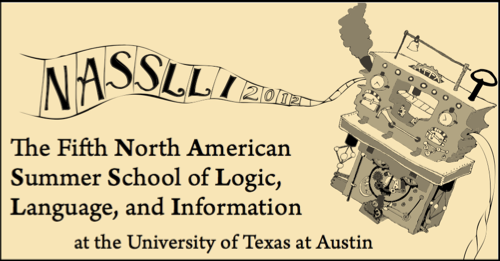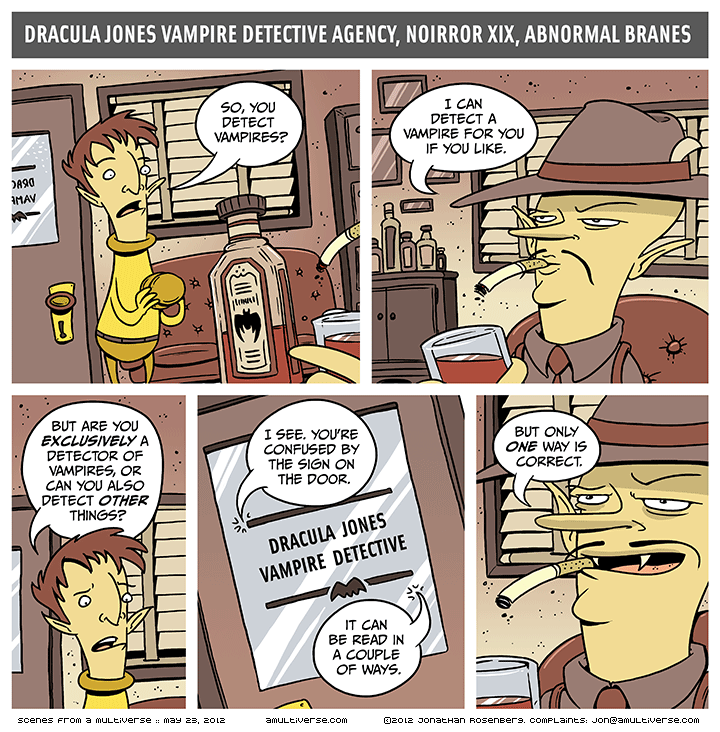Archive for Semantics
June 2, 2012 @ 5:48 am· Filed by Barbara Partee under Logic, negation, Philosophy of Language, Semantics, Syntax
I just found that sentence in the first footnote to William Taubman's "Khrushchev: The Man and his Era" (2003). It's a great example of a "negative event" – we call them "negative events" with scare quotes because it remains controversial whether there are any such things. How can not doing something be an event?
First a clarification: I realize from Googling that there's a completely different sense of "negative event" which is more common and not controversial at all – that's something bad that happens to you, an event with "negative" effects. What linguists and philosophers worry about are sentences or phrases containing negation that seem to denote events, like the one that heads this post.
We chatted a bit about it around the water cooler at Language Log Plaza yesterday, and David Beaver contributed the following nice link:
http://iconicphotos.wordpress.com/2010/01/11/nikita-khrushchev-and-his-shoe/
The discussion there and in Taubman's footnote of the events at the UN General Assembly on October 13, 1960 makes it clear that on the one hand, Khrushchev's banging his shoe on the desk became famous and iconic, and that on the other hand, there is a real dispute about whether it actually happened. That seems to be one circumstance in which something not happening can be described as an event.
Read the rest of this entry »
Permalink
May 29, 2012 @ 2:44 pm· Filed by Mark Liberman under Semantics, Syntax
Although the popular discussion of hopefully often refers to "grammar", in fact no general point of grammar is usually at issue — the (now moribund) hopefully controversy was about the usage of a single word. And the genesis of the controversy, as discussed here and here, was clearly a rapid change between about 1960 and 1975 in the relative frequency of hopefully in the evaluative sense "it is to be hoped". However, one of the common rationalizations for this novelty-aversion does raise some grammatical questions of a more general nature.
Read the rest of this entry »
Permalink
May 23, 2012 @ 9:15 am· Filed by Mark Liberman under Misnegation, Semantics
Daniel J. Wakin, "Met Reverses Itself on Reviews Ban by Opera News", NYT 5/22/2012:
The Metropolitan Opera on Tuesday backed away from its decision to bar reviews of its productions in Opera News, its affiliated magazine and the leading opera publication in the country.
The Met said an “outpouring of reaction” from opera fans on the Internet caused it to change course a day after The New York Times reported that Met officials and the publishers of Opera News had decided to stop reviewing Met shows.
“I think I made a mistake,” said Peter Gelb, the Met’s general manager. “The Metropolitan Opera only exists with the good will of the public. Clearly the public would miss Opera News not being able to review the Met, and we are responding to that,” he added, referring to a “groundswell of disappointment.”
Read the rest of this entry »
Permalink
May 20, 2012 @ 7:11 pm· Filed by Mark Liberman under Semantics
Reader PN wrote to comment on the first sentence of a story by Andres Oppenheimer in the Miami Herald, "US unlikely to condemn Argentina’s ‘outlaw behavior’ — yet", Miami Herald 5/16/2012:
A U.S. congressional proposal aimed at expelling Argentina’s populist-leftist government from the G-20 group of the world’s leading economies faces an uncertain future, not the least because it lacks significant support from unexpected quarters — conservative Cuban-American Republican lawmakers.
PN's comment:
From the rest of the article — and typical attitudes of Cuban-American Republicans to leftist Latin American governments — it seems clear that they are trying to say that the *lack* of support was unexpected. But what a strange way to put it.
Read the rest of this entry »
Permalink
May 14, 2012 @ 7:11 pm· Filed by Barbara Partee under Language and the law, Pragmatics, Semantics
Semantics in the John Edwards trial (James Hill and Beth Lloyd, "John Edwards Defense Relies on Definition of 'The'", Good Morning America 5/13/2012):
Not since Bill Clinton challenged the definition of "is" has so much hinged on a very short word.
John Edwards appears to basing much of his defense, which begins today in a North Carolina courtroom, on the legal interpretation of the word "the." […]
The statute governing illegal receipt of campaign contributions "means any gift, subscription, loan, advance, or deposit of money… for the purpose of influencing any election for federal office."
The words "the purpose" suggests that in order for a conviction, the sole reason for the money would have to be to finance a presidential campaign.
Edwards' legal team has argued … that his main reason for hiding Hunter was to keep her secret from his wife, Elizabeth.
Prosecutors, however, are arguing the law should be interpreted to mean "a purpose," meaning use of the donations does not have to be solely for a political campaign.
Read the rest of this entry »
Permalink
May 9, 2012 @ 9:24 am· Filed by Mark Liberman under negation, Semantics
From Lauri Karttunen (via Arnold Zwicky):
I have come to realize that there are a lot of examples on the web of the type "not want to not X" that seem to say the opposite of what they mean. Here are a few:
She failed to give the patient CPR and turned an ambulance away in the mistaken belief that the elderly woman’s had said she did not want not to be resuscitated. (Cambridge, UK, newspaper article)
If a guest does not want not to be disturbed they need only to place the 'Do Not Disturb" sign on the door and their wishes will be respected. (Florida motel)
In the first case, the mistaken belief was that the elderly woman did not want to be resuscitated. In the second case it should say "If a guest does not want to be disturbed …"
Read the rest of this entry »
Permalink
May 7, 2012 @ 5:53 am· Filed by Mark Liberman under Semantics, Syntax
Bob Ladd asked:
Is there any discussion anywhere of the multiple tense-marking (if that's what it is) in constructions like "We would have liked to have stayed longer" (as opposed to just "We would have liked to stay longer")? And is it just my impression, or has this become more common?
For what it's worth, there's a very clear discussion of what the difference theoretically could be here.
Web search turns up the original lyrics to Elton John and Bernie Taupin's song Candle in the Wind, which includes the line "I would have liked to have known you". You would think some Telegraph reader might have made the connection between the song's popularity and the decline of the English language, but if that happened I can't find any evidence of it.
Read the rest of this entry »
Permalink
March 14, 2012 @ 8:56 pm· Filed by Mark Liberman under Semantics
From Larry Horn, an example of triple negation found in Chad Harbach's 2011 novel, The Art of Fielding. As discussed in "Newt's not not engaging", 12/11/2011, Larry has previously argued that in some cases "double negatives may fail to completely cancel out, instead amounting to a weaker positive than their target would have provided". In his latest find, the triple negative analogously amount to a weakened negative.
Context: Pella Affenlight is sharing an uncomfortable maybe-goodbye dinner at an over-the-hill French restaurant in Westish, Wisconsin with her obnoxious estranged architect husband David, who is trying to remind her about their having made love the previous Christmas when he gave her a pair of sapphire and platinum earrings he now produces at the table. Pella doesn't remember either the sex or the earrings, but the latter do look somewhat familiar to her as well as "gorgeous", and she muses to herself:
She'd have to be crazy not to remember those earrings, and she was clearly not crazy. Opaquely not crazy. Not not not crazy.
Read the rest of this entry »
Permalink
February 25, 2012 @ 1:06 pm· Filed by Mark Liberman under Semantics
Joe Nocera, "A Revolutionary Idea", NYT 2/24/2012:
Puritans fled to America in the 1600s because they were being persecuted in England for their hard-edged, Calvinist beliefs, and their rejection of the Anglican Church. Having one’s ears cut off for having deviationist religious beliefs was one of the lesser punishments Puritans suffered; being locked up in the Tower of London, where death was a near certainty, was not uncommon.
Yet Winthrop and the other Puritans did not arrive on the shores of Massachusetts hungering for religious freedom. Rather, Winthrop’s “city on a hill” was meant to be, in Barry’s words, “an authoritative and theocentric state,” no less tolerant of any deviation of Puritan theology than England had been toward the Puritans.
Read the rest of this entry »
Permalink
January 23, 2012 @ 3:36 am· Filed by Geoffrey K. Pullum under Language and technology, Logic, Lost in translation, Nerdview, Semantics
In the Hotel Ciutat de Tarragona, the beautiful modern hotel in Tarragona where I am currently staying, I ate breakfast in the 1st-floor restaurant (Americans: that would be the 2nd floor), and then came out to take the elevator back up to my 5th-floor room (Americans: 6 floors up). But I was baffled: there was no button to call the elevator for upward journeys. There was just a button labeled with the Down-Arrow symbol for calling the elevator to go back down to the lobby on level 0. Some sort of security, I assumed, to ensure that random restaurant patrons don't go up in the elevator to wander up and down the halls looking for unlocked doors or stealable items. But then how was I to get back up to my room? I'm ashamed to report just how long it took me to resolve the conundrum here. Perhaps you would like to solve it for yourself before you read on.
Read the rest of this entry »
Permalink
January 19, 2012 @ 12:17 pm· Filed by Mark Liberman under Psychology of language, Semantics
John Parkinson, "Boehner on Keystone Pipeline: ‘President is Selling Out American Jobs for Politics’", ABC News, 118/2012:
“President Obama is destroying tens of thousands of American jobs and shipping American energy security to the Chinese. There’s really just no other way to put it,” Boehner, R-Ohio, said. “The president was given the authority to block this project only and only if he believes it’s not in the national interest of the United States. Is it not in the national interest to create tens of thousands of jobs here in America with private investment? Is it not in the national interest to get energy resources from an ally like Canada, as opposed to some countries in the Middle East?”
Read the rest of this entry »
Permalink
December 26, 2011 @ 12:25 pm· Filed by David Beaver under Announcements, Computational linguistics, Logic, Philosophy of Language, Pragmatics, Psychology of language, Semantics
’Tis the season to announce seasonal schools. Geoff Pullum announced a short course on grammar for language technologists as part of a winter school in Tarragona next month, and Mark Liberman announced a call for course proposals for the LSA's Linguistic Institute in summer 2013. But what if you can't make it to Tarragona next month, and can't wait a year and a half to get your seasonal school fix? Well, I have just the school for you!

Read the rest of this entry »
Permalink

